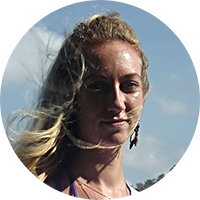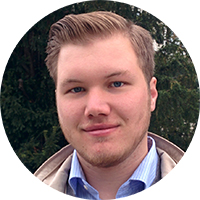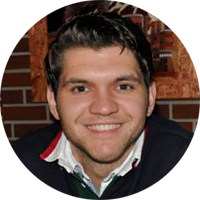Want to Go to Germany…
‘The University of Passau is the youngest HEI in Bavaria but has earnt itself a good reputation since it opened in 1978,’ says Svetlana Maltseva, Academic Supervisor of the Master’s programme in Big Data Systems. ‘For more than ten years the university has occupied a leading position in German and European rankings in Law, Management and International Relations.’
Passau University has an agreement with HSE to offer students on the Master’s in Big Data Systems a place to study for a Master’s diploma in computer sciences in Germany. The number of HSE students is limited to 15 a year. In exchange, the same number of Passau students can come and study at HSE in Moscow. The competition for places on this double diploma programme is underway.
...or maybe you want to go to Austria?
The double diploma program with the University of Applied Sciences Technikum Wien is already in its second year. In 2014/2015 students came from Vienna and began their studies on the double diploma in Moscow. They have successfully completed the first semester. They’ll spend the next two semesters in Vienna and return to Moscow to study in the second semester of 2015/2016 academic year and defend their Masters dissertations.

Anna Kuraeva, student on the programme
As soon as I saw the announcement about the double diploma at Technikum Wien I decided to go for it. I had heard good reports from friends and colleagues who had been on similar international programs, and I am convinced that study abroad will be an invaluable experience for my professional and personal development, not to mention English language practice and the chance to learn German. I also wanted to get to know academic life and culture in Austria. I’m curious about how the whole learning system works in the University of Vienna, from how they distribute materials to traditional teaching practices. But what clinched it for me was the city of Vienna itself. I’ve read about its rich history and musical charms in many tourist brochures and now I have a chance to get to know the city, not just as a tourist but much more closely.
Ahkmet Khasanovich
‘I learnt in Vienna about the Higher School of Economics from work colleagues at Raiffeisen Bank International AG in the consulting and financial services department. The bank has an office in Russia which means that without having to leave my job I can transfer to a different department and combine work with studying in Moscow. Besides professional knowledge I was counting on gaining the experience of meeting and working with international clients and the possibility of unusual personal growth. And my expectations were fulfilled. Big Data is a new and developing area and I was genuinely fascinated in the lectures and seminars by teachers at HSE, Mikhail Komarov and Evgeny Kucheryavy in particular. And another thing, on this HSE programme, students can work with companies which specialise in Big Data. I gained really valuable experience from meeting professionals at Teradata, Oracle, IBM and Croc. Their staff told us a lot of interesting and useful things about how the companies categorise and use big data in practice. And generally, I was very pleased with the friendly way they welcome foreign students at HSE.

Sebastian Kollmann
‘I applied for the double diploma programme because I wanted more international experience and all the big companies, including Erste Bank where I did an internship on data analysis and business analytics, are opening offices in Eastern Europe and Russia. So studying in Russia looked like a good way to combine studying and getting more experience. Also, it improved my language skills to take a course taught in English.
I was impressed by how warmly our fellow students welcomed us in Russia. I can’t overestimate the help they gave us in adjusting to an international cultural environment and in preparing joint group projects. I’d also like to mention the fascinating lectures by representatives of various companies who were invited in to speak.
I’m sure that studying on the Big Data Systems programme will help me career-wise, because big data is a fast developing area and specialists are in high demand on the job market. My feeling about this was confirmed recently when I was looking for part-time work - almost every company where I had an interview gave a positive response and was keen to work with me.’

Andreas Nemeth
The program gives me the opportunity to complement my previous studies in business informatics with specialised knowledge in big data. And the chance to study in one of the best universities in Russia made my decision to enroll into this double degree program quite easy.
My time at HSE Moscow is not exclusively dedicated to studying. The many events organised by HSE and its international student office represent a welcome change in my daily student life and gives me the chance to network with Russian and international fellow students, which I really appreciate. Our program’s administration is on hand all the time with help and advice regarding almost every issue. This great support is very helpful and minimised all the organisational obstacles I have faced so far.
The double degree program in cooperation with the University of Applied Sciences Technikum Wien combines profound knowledge of IT management with big data knowhow. This combination will have a huge impact on my future career.

Daniela Sefzig
The double degree program on offer at the top-rated Higher School of Economics and the University of Applied Science in Vienna awakened my interests. Companies value academic qualifications in Big Data highly which make it an interesting and promising area for a career. In addition, my initial interest in Russian culture, the possibility of a scholarship, and the chance to live in a dormitory in the biggest European metropolis, Moscow, convinced me to apply. The study gives a good overview of the topic and impacts around Big Data. Not only do you get ideas about areas of collecting data you also get knowledge of a set of tools that help you analyze the information and process it for different stakeholders.
All who wish to apply for selection on to the Big Data Systems programme must submit a portfolio and pass a written and listening comprehension English test. It is a two year programme offering 25 places - 20 with government grants, 5 fee paying.
See also:
‘These Are Very Promising Specialists in Product Management and Data Analysis’
HSE University launched the Master’s in Data-Driven Communication in 2019. The programme is aimed at promising managers who want to master modern technologies for working with clients. It trains professionals in product management and marketing who know how to work with data and AI.
Faculty of Computer Science Lab Develops Monitoring System for LHC Experiment
Researchers from the Laboratory of Methods for Big Data Analysis (LAMBDA) at the HSEFaculty of Computer Science have created a monitoring system that is used in the Large Hadron Collider beauty experiment (LHCb). The system helps track the quality of the collected data and allows operators to quickly find errors.
Pivot to the East: A Comprehensive Study of the Cultural and Civilisational Centres of the Non-Western World is the Top Priority
China and the Chinese world, South Asia, Southeast Asia, the Arab countries, Iran, Turkey, Central Asia and Africa are gaining new significance in Russia’s foreign policy. However, we do not know enough about the Eastern countries. It is necessary to change the priorities in education, starting from grammar school. Prospects for the development of domestic Oriental studies in the context of the new stage in the development of the system of international relations were discussed at a round table at HSE University.
‘I Admire HSE Students’ Eagerness to Learn, to Discuss, to Broaden Their Perspectives’
Robert Romanowski was a ‘Digital Professor’ at HSE University in November 2021. In his interview for the HSE News Service, he talked about the specifics of online teaching, his course on Strategic Branding, and the skills that are essential for marketing professionals today.
Russia and Africa: Time to Expand Cooperation
There is major potential for economic and humanitarian cooperation between Russia and African countries. Particularly, Russian organisations and universities can help transfer competencies and knowledge in the fields of agriculture, energy, industrial production, environmental management, climate change, and public administration. Experts and representatives of African embassies in Russia discussed these issues at the round table ‘Russia-Africa Sharing Knowledge’ hosted by HSE University.
The Brain in Space: Investigating the Effects of Long Spaceflights on Space Travellers
As part of an international project conducted with the participation of Roscosmos and the European Space Agency, a team of researchers used differential tractography to analyse dMRI scans ofcosmonauts’ brains and found significant changes in brain connectivity, with some of the changes persisting after seven months back on Earth. The paper is published in Frontiers in Neural Circuits.
HSE University-Perm and the Training Centre of the Uzbek Ministry of Finance Sign Cooperation Agreement
HSE University in Perm has become the first academic partner of the Training Centre under the Ministry of Finance of the Republic of Uzbekistan. The parties have signed a cooperation agreement in education and research.
Economic Empowerment at HSE University
HSE University alumna Dr. Elena Podkolzina recently became an academic supervisor of the newly established master's programme in Economics and Economic Policy. Having been part of HSE University for nearly 25 years now, Dr. Podkolzina recalls her student years and shares her experience as deputy director of the Center for Institutional Studies.
HSE University Strengthens Ties with Netherlands in Agricultural Research and Education
On November 9, 2021, HSE University signed a memorandum of understanding with Wageningen University & Research, a major university in the Netherlands and one of the leading agricultural research institutes in the world. Participants of the signing ceremony included HSE University Rector Nikita Anisimov, President of the Wageningen University & Research Executive Board Professor Louise Fresco, and Dutch Ambassador to Russia Gilles Beschoor Plug.
The Majority of Russians Do Not Support Microchip Implants
The majority of Russians would not agree to being fitted with microchip implants for any purposes—medical or otherwise. A joint study conducted by HSE University’s International Laboratory for Applied Network Research and Aventica found that respondents believe the risks of personal data leaks and misuse to be too high.



